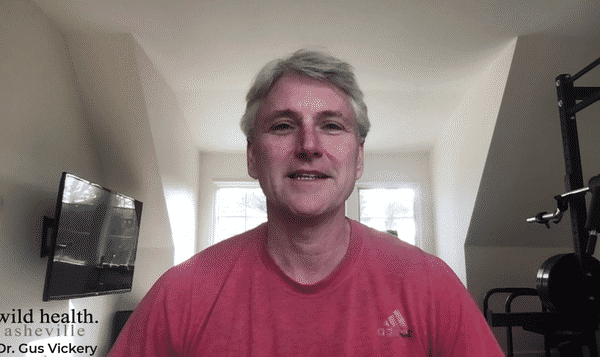I just saw a patient this past week, and it made me think about the concept of sending our brain the right message for weight loss that I think is really important for you to grasp. The book, Authentic Health, describes this in a little more detail in the chapter on what it takes to keep a body healthy. I would encourage you to read that, and really think about what I communicate there, because it is the truth.
A Case Study
The gentleman I saw was middle aged, and he’s a little overweight, and he doesn’t feel as good as he’d like to. Again, it’s a really common scenario I’ve come across. He was in for a general checkup and we both agreed that losing a little weight would help him feel better. I asked him what plan he thought he may consider for this, and he said, “Well, I’m joining a gym.”
Now I get this a lot. People like to join a gym. Gyms love this because they get a lot of memberships and oftentimes people don’t end up following through. If a gym is the best place for you to pursue exercise, then go for it. I’m all for that. I’m not here to discuss the ins and outs of the gym industry. My main issue is a consistency of movement for you.
>
“My point is this: his answer to losing weight was to go to the gym.”
I want to make it clear that I like the idea of him getting exercise. I have an entire chapter about the importance of physical activity and movement in my book. Strength training is a great message for the body. It strengthens:
-
Bones
-
Muscles
-
Upregulates hormones
-
Improves metabolism
-
Lowers insulin resistance
It really is a great treatment for feeling good. I also think that regular aerobic or interval training, and mobility exercises are all really good for the body. Those are powerful messages that produce responses in your body that give you back physical and mental health. You feel good when you use your body. I’m a big fan of that.
Primary Weight Loss Tool
But that is not the primary way to lose weight. When we’re talking about losing weight, we’re talking about a change in our body composition. We’re talking about reducing the amount of fat stored on our body. If your amount of fat stored is actually at your genetic baseline, your basic genetic profile for your body composition, then losing that fat is going to be very challenging. It’s going to take ongoing maintenance. Unless it is a very specific goal for you to get as lean as you possibly can, I don’t recommend that for people who are at their healthy genetic weight.
In this case, this gentleman is 30 lbs heavier than he ought to be, and we both know it, and his laboratory data shows it. I do agree with his plan to lose weight. I just didn’t agree with his primary mechanism of doing so, which is to go to the gym. I agree with going to the gym, but that’s not going to produce weight loss for him. Yes, he will burn calories, and yes, that’s good. Of course, if you burn more calories than you take in in a given day for a period of time, your body will shed body weight.
However, we stress in our teaching how your body weight and body composition is regulated hormonally, and this is determined by a set point in a region of your brain. Ultimately, the primary messengers about this body fat are hormones. Hormones are messengers that respond to stimuli.
-
How you eat
-
How you move
-
How stressed you are
-
The levels of nutrients in your system
These things evoke a hormonal response. It’s all about what message you send your body so that your internal messages—meaning your hormones, and in your brain, your neurotransmitters—will produce the response you’re looking for. In this case, this gentleman wants to get leaner.
I had to point him back to his approach to nutrition. If he wants to lean out, it’ll come through how he approaches nutrition. The movement is great, but it’s a tiny part of the overall equation.
>
“Nutrition is the primary message for weight loss.”
Of course, that’s not what he wanted to do because that’s more challenging for him, as he himself stated. He really enjoys food, he enjoys his current pattern of eating, and he doesn’t really want to change that. It’s uncomfortable. Whereas going to the gym is an actual long-standing, positive habit for him. He falls out of it occasionally, but when he returns to it, he feels good, and it’s very familiar to him. It’s something that’s easy for him to do. He has the circuitry in his brain grooved for going to the gym on a consistent basis for a certain amount of time each year. There’s not much resistance to it, so it’s easy for him. It’s his default mindset.
But changing his eating is a much harder thing. He does not have consistent circuitry in his brain that is grooved to help him achieve that. In the past, he has typically not had success. He could perhaps do a 30-day program, feel a little better, but then he reverts back to his normal eating habits. There are many reasons for this, and we discuss them in our various documents.
Ultimately, the challenge for him is to permanently alter his approach to food if he wants to lean out. I was able to give him that news and keep it positive, and tell him how slow he can go. He doesn’t need to lose 30 lbs in three months like he’d like to. He can lose this 30 lbs over the next year, and it won’t be that hard to do, and he will improve his health and how he feels. But it’s going to involve not just a temporary change in his nutrition, but a consistent change.
>
“Your approach to eating is the primary driver of how your body regulates its stored energy: namely your fat.”
What Is Your Approach to Eating?
If you’re trying to get strong, or build muscle, do strength training. But if you’re trying to lose weight, you need to change your eating behaviors. We have a lot of materials with different ways of accomplishing that, which can help you build a strategic mindset to increase your chances of success. In this case, this gentleman agreed the easiest thing for him was to not think about it, so he agreed to an intermittent fasting protocol that I developed for him. I suspect by following that program, we’re going to see him losing that 30 lbs over about 6 months.
If you want to get stronger, strength train. If you want to lose weight, change your nutrition. Send the right message to your brain, and you’ll get the right response in return.
If you need help with an individualized program, please contact our office, or come to our Facebook page and see how others are doing, or read some of our other materials. The main issue is, you are getting back the version of yourself that you are messaging to your brain. If you need to change that, you need to get the messages right.







